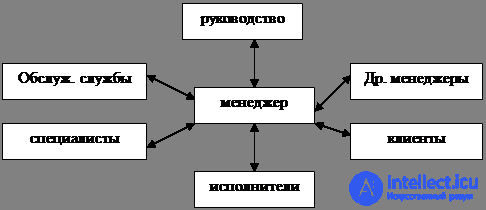Lecture
Organizat. behavior and manager.

3 ur-nya studying organizations. behavior .:
1) Individual.
The study of the nature of the people, allowing to identify the factors affecting the effectiveness of the work of the individual,
her motivation and interpersonal skills.
2) Group.
Group - 2 or more people interacting with each other g / achieve their goals.
A team is a group of people, a cat. Work to achieve common goals.
3) Organizational.
Allows you to identify the dependence of the org-tion structure and org. cultures on the behavior of people and groups on their
attitude to work, the desire to achieve common goals.
Managers who understand organizational behavior can more successfully implement it.
4 f-tsii management:
1) Planning. Definition of organizational strategy, allocation and use of resources
d / achieve the goal. Problem: uncertainty, risk.
Helping org-go behavior: allows you to reduce risk and improve the quality of decisions, showing how decisions are made at the organization, how the techniques and conflicts that occur affect the planning and decision-making process, how they manifest themselves when planning and making group decisions.
2) Organization. Establishing the structure of workers. relations, rights of subordinates, the distribution of employees into groups, teams, departments. Problem: conflicts, the politicization of staff.
Knowledge of org. behavior gives: recommendations for staff org. organization in order to make optimal use of skills, abilities, abilities, to develop communication skills, coordination of actions.
3) Guide. Encouraging, coordinating staff actions to achieve goals. Problem: unwork
motivational incentives.
Study of handwriting methods acc. hands-on style har-kam companies improves the quality and efficiency of work.
4) Control. Assess how well the organization achieves its goal, take measures to improve and maintain the performance indicators. Problem: lack of evaluation criteria.
Knowledge of org. behavior gives: theory and concept of op give tools for evaluating the slave. situations, their characteristics by taking corrective actions.
The distribution of the manager’s time for the implementation of management functions:
a) traditional. management - 32%
b) communication - 19%
c) human management. resources - 20%
d) establishment of communication - 29%
To effectively perform the body. F-tsii managers should possess 3 components of skill:
1) conceptual experience
2) human experience
3) technical qualification
What does a successful manager do? Solves people's problems.
Managers working in org as social systems.
A manager working in real conditions => his behavior is restricted:
- time
- it is necessary to establish informally. Totally
- real usl
Managers pay attention to verbal contacts– (65-80% of work time), informal communication– (45% p.)
Mang d.b. good communicator.
3 har-ki is good. communicator:
1) Well-formulated desired cutoff (goal, adjusted clarity of information transfer).
2) Sensory sensitivity (see, hear, feel).
3) Behavioral flexibility (distance, speech, gestures, etc.)
The problem of organizational behavior and management.
1) How to manage human resources d / ensure a competitive advantage org-tion.
2) How to develop an ethically acceptable organism. structure.
Under the organizational ethics are understood the rules, beliefs, values that define what is good or bad, as well as how men-ry and employees should behave in certain situations.
3) How to manage a heterogeneous composition of employees (age, gender, religion, abilities, etc.)
4) How to manage the body. conduct when the organization begins to operate on an international scale.
Features org. behavior in Russian org:
- crisis of motivation
- negative transformation of the concept of modern labor activity
- the need to develop new abilities of the staff
- the use of manipulation and other hard psychological methods as DOS. methods of influencing workers
- search for moral support in their children and fear of old age.
Comments
To leave a comment
Organizational behavior
Terms: Organizational behavior